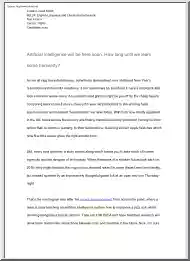A doksi online olvasásához kérlek jelentkezz be!

A doksi online olvasásához kérlek jelentkezz be!
Nincs még értékelés. Legyél Te az első!
Mit olvastak a többiek, ha ezzel végeztek?
Tartalmi kivonat
A Guide to Buying Land You can spend a lot of time attending open house events, searching through online listings to find your dream home and still be unsuccessful. Maybe your dream home does not exist yet. A better option may be acquiring a piece of land and building exactly what you want. Here’s a guide to help you find the piece of land that’s perfect for you. Determine your reason for purchasing land Maybe you’re buying land to build a home for you and your family or perhaps you see land as a better investment than stocks, shares or other assets. Whatever your reason, you certainly need to be clear on your intentions as this will determine what and where you buy. Speak with a CIBC FirstCaribbean Sales Specialist A CIBC FirstCaribbean Sales Specialist can review your finances and guide you through this process. We can also pre-qualify you, so you have a strong indication of how much you can afford and can limit your search to the appropriate properties. Use a Real Estate
Agent Using a realtor can speed up your chances of finding the perfect piece of land, as they have access to multiple property listings. Best of all, it doesn’t cost you anything to use them – they’re compensated from the commission paid by the seller of the land. Your CIBC FirstCaribbean Sales Specialist can connect you with a real estate agent in your area. Choose the right piece of land When you start looking around at land, there are things you should consider: a. Location – Most people care a great deal about who and what they live next to; so be sure you’re building your dream home in a neighborhood with similar taste to yours and close access to your preferred amenities. b. Zoning classification – Zoning limits the potential use of the land and what can be built on the parcel. Make sure you confirm the current and pending zoning restrictions before signing and closing the sale. c. Improved vs undeveloped land – Improved land has undergone upgrades such as
utilities, landscaping, roads, and adequate drainage, which make the land more usable. Alternatively, raw land is undeveloped with no infrastructural improvements done or in close proximity. While raw land is usually less expensive than improved land to purchase, it is very costly to prepare for building and typically reduces the amount of financing you can obtain. d. Availability of utilities – It’s easy to take access to running water, electricity, natural gas and sewers for granted when you’re buying an existing house, but with vacant land these are not always a given. Depending on how developed the area is around the land, you will need to confirm the infrastructure in place. e. Land topography – It is very important to understand the elevations, cliffs, valleys, hills, etc. of the land you intend to purchase, as these factors influence how costly it will be to build. f. Foundation – The cost to complete your house can escalate substantially if your land hides surprises
below the surface. Ideally, you should have test holes done on multiple areas of the land to assess how deep you may have to dig before you reach solid rock. g. Boundary lines – This is extremely important when buying land as it legally defines the exact amount of land you are getting. Knowing your boundaries will allow you to build or expand your home without encroaching on neighbouring properties. h. Encumbrances – Be sure to confirm the land you intend to purchase is free of any legal issues or unpaid dues, as this can prevent you from finalizing the sale or cause you to incur additional costs. Your lawyer can assist you with this i. Restrictive Covenants – These are binding conditions written into a property’s deeds or contract by a seller that determines what property-owners can or cannot do with the land or the house to be built. For example, restrictions on building heights and the use of certain building materials or preventing trades or businesses from operating on the
land. 1 j. Easements – An easement legally gives someone rights to use another person’s land in some specified way. For example, a sewage or drainage line may have to pass through your land. Easements can significantly affect the way you can use and enjoy your property. Therefore, it is important to make the appropriate enquiries into all easements affecting the property you’re about to purchase. k. Accessibility – Make sure the land is easily accessible and not landlocked (i.e, completely surrounded by other lots). This is not only important for your convenience, but also affects the value and marketability of the property and whether you can obtain financing. g. Copy of purchase agreement (to be signed after loan approval and legal counsel) h. Valuation/appraisal report on property being purchased (report will be requested by CIBC FirstCaribbean) i. Self-employed applicants – Last three years’ financial statements to include: ✔ Profit &
Loss statements ✔ Balance Sheet ✔ Cash Flow ✔ Notes to Financials A full set of tax returns for the last three years Submit your application for underwriting We will evaluate your application through a process called underwriting. The goal is to assess your ability to repay the money you’ve requested in your application and avoid putting you under financial strain. CIBC FirstCaribbean will provide status updates and let you know if more information is required to support documents already submitted. Get the land appraised Submit your documentation Your CIBC FirstCaribbean Sales Specialist will advise you of the documents required; however we have outlined the main documentation required below: a. National identification card or valid passport b. Recent utility bill (less than 3 months old) or recent statement from a financial institution for address verification c. Job letter (must include remuneration, office held, length of employment) d. Most
recent pay slip e. Last 3 months bank/credit union statements for the following: i. ✔ Savings and chequing accounts ii. ✔ Loan and credit card balances iii. ✔ Hire purchase accounts iv. ✔ Credit bureau report (if available) f. Proof of down payment and closing costs (evidence of funds that will represent your financial contribution) CIBC FirstCaribbean will request a valuation report on your behalf from an appraiser on our approved list. You are responsible for paying this cost The appraiser will provide an independent estimate of the value of the land you are buying and let all the parties involved know whether you are paying a fair price for the property. Source a good lawyer/solicitor Completing thorough searches is especially important when buying land. Ownership claims on vacant land can be more involved than buying an already constructed property where title searches, liens or claims on ownership have already been resolved. Previous legal
searches are often not performed on vacant land. You may find multiple parties having legitimate claims to a parcel by way of inheritance, easements, or gifting. 2 Close the sale This is when you will assume legal ownership of the property from the seller. Your CIBC FirstCaribbean Sales Specialist will provide you with a detailed list of closing costs in an estimate. However, we have also provided a list detailing the breakdown of this cost: • Deposit/contribution • CIBC FirstCaribbean’s negotiation fee • Appraisal report fee • Legal fees • Stamp duty and transfer fees (where applicable) At this time you will also be required to sign all your loan and sale agreements. You will also visit the office of your lawyer/solicitor to finalise the closing. You will want to make sure you have personal identification, any other required documents and the payment to cover your closing costs. Owning your piece of land Congratulations! You are one-step closer to building your
dream home. Remember when you buy land, taxes are the one ongoing expense you will face aside from a loan payment. You will also need to make sure that the lot is cleared periodically and not obstructive to neighbours or the public. Over time as you build equity in your property, you can use the equity as your mortgage deposit to build your home. Should you require any assistance in doing this, speak with a CIBC FirstCaribbean Sales Specialist. To get started on your journey, call 1 866 743-2257 and speak with a CIBC FirstCaribbean Sales Specialist. Readers are strongly advised that this document is not a substitute for legal and other professional advice. As such, readers are also strongly advised to seek legal and professional advice when purchasing land, building or buying a home and not rely solely on the contents of this document. The contents listed are subject to change from time to time The CIBC logo is a trademark of Canadian Imperial Bank of Commerce, used by FirstCaribbean
International Bank under license. 3
Agent Using a realtor can speed up your chances of finding the perfect piece of land, as they have access to multiple property listings. Best of all, it doesn’t cost you anything to use them – they’re compensated from the commission paid by the seller of the land. Your CIBC FirstCaribbean Sales Specialist can connect you with a real estate agent in your area. Choose the right piece of land When you start looking around at land, there are things you should consider: a. Location – Most people care a great deal about who and what they live next to; so be sure you’re building your dream home in a neighborhood with similar taste to yours and close access to your preferred amenities. b. Zoning classification – Zoning limits the potential use of the land and what can be built on the parcel. Make sure you confirm the current and pending zoning restrictions before signing and closing the sale. c. Improved vs undeveloped land – Improved land has undergone upgrades such as
utilities, landscaping, roads, and adequate drainage, which make the land more usable. Alternatively, raw land is undeveloped with no infrastructural improvements done or in close proximity. While raw land is usually less expensive than improved land to purchase, it is very costly to prepare for building and typically reduces the amount of financing you can obtain. d. Availability of utilities – It’s easy to take access to running water, electricity, natural gas and sewers for granted when you’re buying an existing house, but with vacant land these are not always a given. Depending on how developed the area is around the land, you will need to confirm the infrastructure in place. e. Land topography – It is very important to understand the elevations, cliffs, valleys, hills, etc. of the land you intend to purchase, as these factors influence how costly it will be to build. f. Foundation – The cost to complete your house can escalate substantially if your land hides surprises
below the surface. Ideally, you should have test holes done on multiple areas of the land to assess how deep you may have to dig before you reach solid rock. g. Boundary lines – This is extremely important when buying land as it legally defines the exact amount of land you are getting. Knowing your boundaries will allow you to build or expand your home without encroaching on neighbouring properties. h. Encumbrances – Be sure to confirm the land you intend to purchase is free of any legal issues or unpaid dues, as this can prevent you from finalizing the sale or cause you to incur additional costs. Your lawyer can assist you with this i. Restrictive Covenants – These are binding conditions written into a property’s deeds or contract by a seller that determines what property-owners can or cannot do with the land or the house to be built. For example, restrictions on building heights and the use of certain building materials or preventing trades or businesses from operating on the
land. 1 j. Easements – An easement legally gives someone rights to use another person’s land in some specified way. For example, a sewage or drainage line may have to pass through your land. Easements can significantly affect the way you can use and enjoy your property. Therefore, it is important to make the appropriate enquiries into all easements affecting the property you’re about to purchase. k. Accessibility – Make sure the land is easily accessible and not landlocked (i.e, completely surrounded by other lots). This is not only important for your convenience, but also affects the value and marketability of the property and whether you can obtain financing. g. Copy of purchase agreement (to be signed after loan approval and legal counsel) h. Valuation/appraisal report on property being purchased (report will be requested by CIBC FirstCaribbean) i. Self-employed applicants – Last three years’ financial statements to include: ✔ Profit &
Loss statements ✔ Balance Sheet ✔ Cash Flow ✔ Notes to Financials A full set of tax returns for the last three years Submit your application for underwriting We will evaluate your application through a process called underwriting. The goal is to assess your ability to repay the money you’ve requested in your application and avoid putting you under financial strain. CIBC FirstCaribbean will provide status updates and let you know if more information is required to support documents already submitted. Get the land appraised Submit your documentation Your CIBC FirstCaribbean Sales Specialist will advise you of the documents required; however we have outlined the main documentation required below: a. National identification card or valid passport b. Recent utility bill (less than 3 months old) or recent statement from a financial institution for address verification c. Job letter (must include remuneration, office held, length of employment) d. Most
recent pay slip e. Last 3 months bank/credit union statements for the following: i. ✔ Savings and chequing accounts ii. ✔ Loan and credit card balances iii. ✔ Hire purchase accounts iv. ✔ Credit bureau report (if available) f. Proof of down payment and closing costs (evidence of funds that will represent your financial contribution) CIBC FirstCaribbean will request a valuation report on your behalf from an appraiser on our approved list. You are responsible for paying this cost The appraiser will provide an independent estimate of the value of the land you are buying and let all the parties involved know whether you are paying a fair price for the property. Source a good lawyer/solicitor Completing thorough searches is especially important when buying land. Ownership claims on vacant land can be more involved than buying an already constructed property where title searches, liens or claims on ownership have already been resolved. Previous legal
searches are often not performed on vacant land. You may find multiple parties having legitimate claims to a parcel by way of inheritance, easements, or gifting. 2 Close the sale This is when you will assume legal ownership of the property from the seller. Your CIBC FirstCaribbean Sales Specialist will provide you with a detailed list of closing costs in an estimate. However, we have also provided a list detailing the breakdown of this cost: • Deposit/contribution • CIBC FirstCaribbean’s negotiation fee • Appraisal report fee • Legal fees • Stamp duty and transfer fees (where applicable) At this time you will also be required to sign all your loan and sale agreements. You will also visit the office of your lawyer/solicitor to finalise the closing. You will want to make sure you have personal identification, any other required documents and the payment to cover your closing costs. Owning your piece of land Congratulations! You are one-step closer to building your
dream home. Remember when you buy land, taxes are the one ongoing expense you will face aside from a loan payment. You will also need to make sure that the lot is cleared periodically and not obstructive to neighbours or the public. Over time as you build equity in your property, you can use the equity as your mortgage deposit to build your home. Should you require any assistance in doing this, speak with a CIBC FirstCaribbean Sales Specialist. To get started on your journey, call 1 866 743-2257 and speak with a CIBC FirstCaribbean Sales Specialist. Readers are strongly advised that this document is not a substitute for legal and other professional advice. As such, readers are also strongly advised to seek legal and professional advice when purchasing land, building or buying a home and not rely solely on the contents of this document. The contents listed are subject to change from time to time The CIBC logo is a trademark of Canadian Imperial Bank of Commerce, used by FirstCaribbean
International Bank under license. 3




